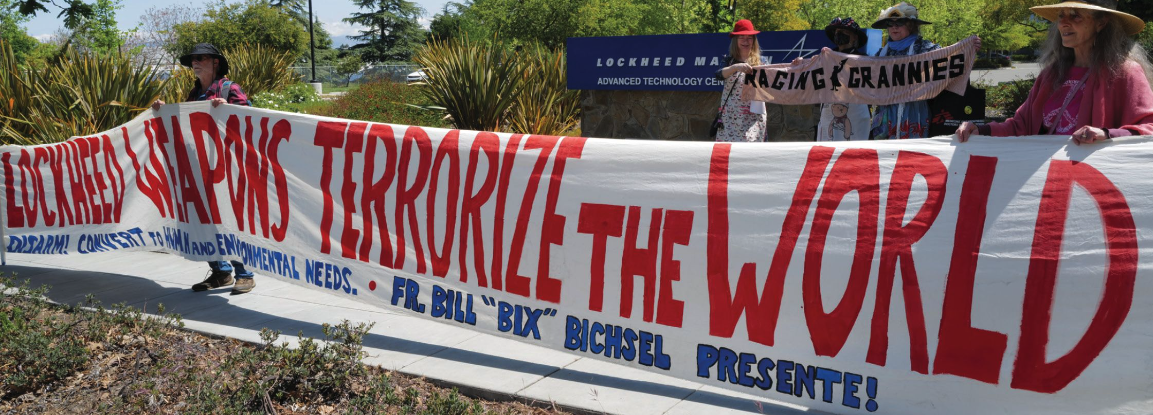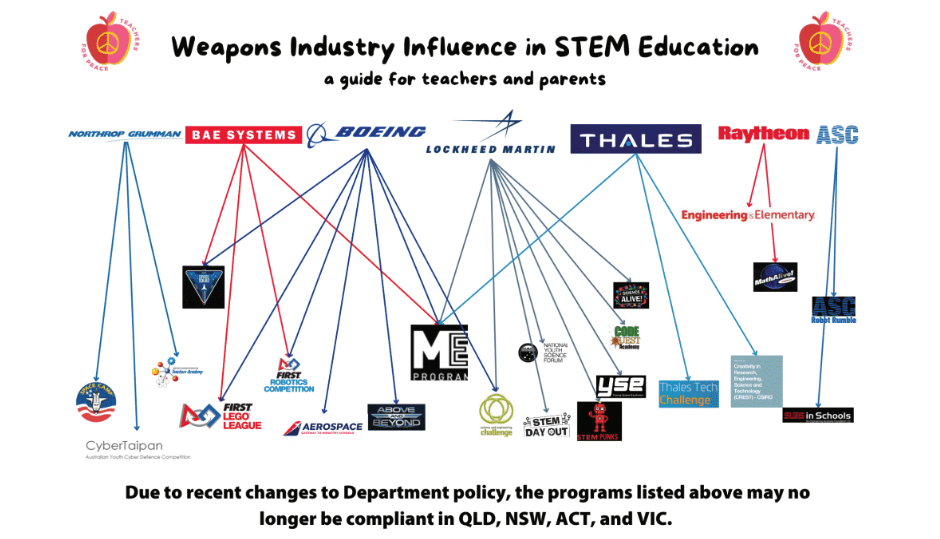How would you feel about Ronald McDonald teaching a science class? What about Joe Camel? The thought of these iconic yet morally dubious brands having the keys to the classroom would make the hairs on the backs of most people’s necks stand up, Teachers for Peace writes.
So, what about a company with a share price linked to the proliferation of armed conflict? What might such a company be incentivised to include in a science lesson, and what might it leave out?
When a company is in the business of selling weapons, it has a fiduciary duty to shareholders to maximise returns, so it can quickly find itself gleefully reporting on outbreaks of conflict and the sales it is expected to drive. Of the war in Ukraine, Raytheon Technologies CEO Greg Hayes said: “We fully expect to see benefits from it.”
Defence stocks jumped almost 20 per cent in the first month of the conflict.
Eradicating undue influence
Lockheed Martin is the largest weapons manufacturer in the world, with revenues in the tens of billions every year.
It was also the major partner for the 2024 National Youth Science Forum held in Brisbane and Canberra in January, even though state Education Department policies prohibit schools from having commercial relationships with weapons manufacturers.
In spite of this, the Medical Association for the Prevention of War has identified more than 20 programs with ties to weapons companies.
This rapid growth has prompted the formation of a growing professional non-profit group called Teachers for Peace. The group campaigns to eject weapons industry influence from STEM (science, technology, engineering and mathematics) classrooms and promote education approaches that foster peace and safety.
Teachers for Peace believe that allowing the military industrial complex any influence on education creates opportunities for the industry to normalise war and engender militarism in the next generation.
Keeping influence out of classrooms
In the 2016 Defence White Paper, the Federal Government articulated Australia’s ability to manufacture weapons domestically as a national security issue.
By reframing the industry as a “key input to capacity” they seamlessly conflated private profitability with public safety. This was a boon to the weapons industry, as it made space for the state to openly use public money to assist the industry to grow, and talk about it like a public service.
Then came the release of the defence export strategy in 2018, which includes the strategic objective of Australia becoming one of the world’s top 10 exporters of weapons by 2028. The state seems willing to give industry all the money it needs to make this happen, but industry can’t find the people.
By 2019, the Department of Defence released the “Defence and Industry Skilling STEM Strategy” – reinforcing the conflation of the actual defence forces with the private companies that supply them. The report identified that the number of jobs “generally held by STEM qualified people” was growing 1.5 times faster than other types of jobs. Therefore, the challenge of attracting qualified people to the weapons industry in a climate where their skills are in high demand was acute.
The theme of this document is encapsulated in the first sentence: “In a time of increasing technological advancement and rapid change, Australia’s defence industry will be competing with other sectors for the workforce needed to deliver and support critical Australian Defence Force capability.”
In other words, the aim is to recruit people with STEM skills away from the fields of medical science, health sciences, climate sciences, regenerative agriculture, food security, and many other socially necessary applications of their skills. Finding workforces for those industries is apparently not the remit of government.
“Despite recent policy changes that clearly aim to ban these mechanisms of influence, we are not seeing the programs being pulled from schools, even in jurisdictions where they may be in breach of policy,” Teachers for Peace member Miriam Torzillo says.
“We believe this is because the companies tend to hide their associations with the programs, so teachers don’t know that there is a global weapons giant hiding behind a robotics competition. That’s not on teachers, the companies design it that way.”
Students shaped by educational environment
Teachers for Peace have paused to celebrate and welcome every jurisdiction’s policy change which has ruled out weapons companies as suitable candidates for “industry partnerships”, but our work is far from finished.
We will continue to advocate for policy change in the jurisdictions where it is still needed, but we are also putting effort into providing information and resources to teachers so they know which programs to be suspicious of.
There was a lot of outrage about the Nuclear Propulsion Challenge, given the controversial nature of the AUKUS submarine deal. We are building from that momentum to show school communities that the problem runs much deeper than just one program. We encourage everyone reading this to get in touch, so we can put the education system back in service of students and their communities, rather than private corporations.
“Education is more than just the transfer of knowledge,” says Miriam Torzillo. “It is also the environment in which young people spend most of their time. That environment shapes them, and if we allow multinational weapons companies to decide what it is and isn’t important for them to know – what will it shape them into? What do we not teach them, simply because industry doesn’t demand that they know about it?”
For a list of programs with ties to the weapons industry, see the MAPW Report, Minors and Missiles, and the resources available at teachersforpeace.org
References
Marksteiner et al. (2021) SIPRI Fact Sheet: The SIPRI Top 100 arms-producing and military services companies, 2020. Available at: https://www.sipri.org/sites/default/files/2021-12/fs_2112_top_100_2020.pdf [accessed 17/10/23]
Motley Fool Transcribing. 2022. Raytheon Technologies (RTX) Q4 2021 Earnings Call Transcript. Available at: https://www.fool.com/earnings/call-transcripts/2022/01/25/raytheon-technologies-rtx-q4-2021-earnings-call-tr/ [accessed 17/10/23]
Klebnikov. (2022) War Stocks are Surging as Russia-Ukraine Conflict Rages on: Lockheed Martin, Northrop up 20%. Forbes. Available at https://www.forbes.com/sites/sergeiklebnikov/2022/03/04/war-stocks-are-surging-as-russia-ukraine-conflict-rages-on-lockheed-martin-northrop-up-20/?sh=175dcdee43f0 [accessed 17/10/23]
National Youth Science Forum. (date not provided). Our Partners. Available at https://www.nysf.edu.au/our-partners/ [accessed 17/10/23]
Medical Association for the Prevention of War. 2022. Minors and Missiles. Available at https://www.mapw.org.au/wp-content/uploads/2023/04/Minors-Missiles-2022-FINAL-jan-31_2023.pdf [accessed 17/10/23]
Teachers for Peace: teachersforpeace.com.au
Australian Government, Department of Defence. (2016). Defence White Paper. Available at https://www.defence.gov.au/sites/default/files/2021-08/2016-Defence-White-Paper.pdf [accessed 18/10/23]
Australian Government, Department of Defence. (2018). Defence Export Strategy. Available at https://www.defence.gov.au/business-industry/export/strategy [accessed 18/10/23]
Australian Government, Department of Defence. (2019). Defence Industry Skilling and Stem Strategy. Available at https://www.defence.gov.au/business-industry/industry-capability-programs/defence-industry-skilling-stem-strategy [accessed 18/10/23]
NSW Department of Education. (2023). Commercial Arrangements, Sponsorship, and Donations Policy. Available at https://education.nsw.gov.au/policy-library/policies/pd-2009-0399 [accessed 18/10/23]
Queensland Government. (2023). Sponsorship Procedure. Available at https://ppr.qed.qld.gov.au/pp/sponsorship-procedure [accessed 18/10/23]
Vic Department of Education. (2022). Sponsorship Policy. Available at https://www2.education.vic.gov.au/pal/sponsorship/policy [accessed 18/10/23]
ACT Department of Education. (2001). Corporate Sponsorship Policy. Available at http://www.det.act.gov.au/__data/assets/pdf_file/0006/17628/sponsor.pdf [accessed 18/10/23]
Queensland (Qld Government, 2023), New South Wales (NSW Dept of Education, 2023), Victoria (Education Vic, 2022), and the ACT (ACT Dept of Education, 2001).





































































































































